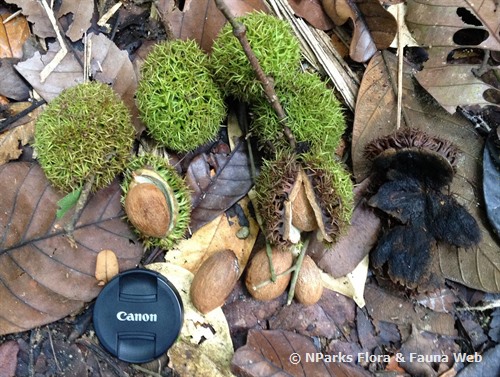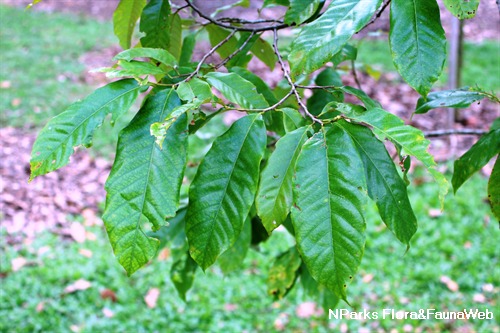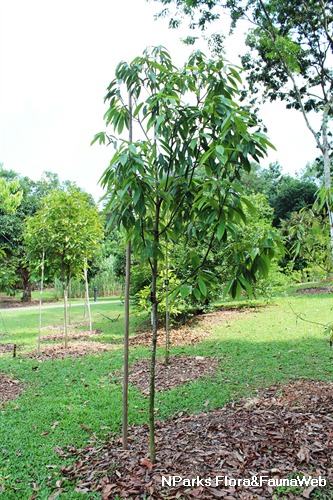
Back
Castanopsis schefferiana Hance
| Family Name: | Fagaceae |
| Synonyms: | Castanopsis andersonii Gamble |
| Common Name: | Berangan |
Castanopsis schefferiana is a medium sized tree native to Singapore that grows to 24 m tall. It has thick, leathery foliage, dark green above, pale coloured below. Flowers are unisexual, greenish, 3-4 sepals borne in clusters of 12 -15 each at the tips of the branches. It produces tight clusters of pear-shaped to globular cupules, covered in thick, dense, curved spines. Upon maturity, it splits to reveal 2 - 3 chestnut-brown fruit.
Name
Classifications and Characteristics
| Plant Division | Angiosperms (Flowering Seed Plants) (Dicotyledon) |
|---|---|
| Plant Growth Form | Tree (Medium (16m-30m)) |
| Lifespan (in Singapore) | Perennial |
| Mode of Nutrition | Autotrophic |
| Plant Shape | Irregular |
| Maximum Height | 30 m |
Biogeography
| Native Distribution | Malesia; Sumatra, Riouw and Lingga Archipelago, Peninsular Malaysia, Singapore |
|---|---|
| Native Habitat | Terrestrial (Primary Rainforest, Secondary Rainforest) |
| Preferred Climate Zone | Tropical |
| Local Conservation Status | Native to Singapore (Critically Endangered (CR)) |
Description and Ethnobotany
| Growth Form | It is a medium to large-sized tree up to about 30 m tall, with buttress roots sometimes present, and smooth grey bark. |
|---|---|
| Foliage | Leaves are thick, leathery, ovate-lanceolate to lanceolate-oblong, widest about the middle, measuring 9 - 19 cm long and 2.5 - 7 cm wide. The leaves are glossy, dark green above, pale below, the mid rib is strongly prominent below, slightly raised above. The terminal buds are covered with short fine hairs on the outside. |
| Flowers | Flowers borne on a spike inflorescence, usually unisexual, or androgynous with its female flowers borned on the lower parts or mixed among the stalk. The flowers are minute, cup-like measuring 0.8 - 1 mm long and 0.5 - 0.7 mm wide, held on a 1 mm bract. Male flowers tend to emit a strong musty smell. |
| Fruit | A tight cluster of dry, pear-shaped to globular cupule, a woody structure enclosing the fruit (nut) completely. The spines are thick, curved, dense, measuring 4 - 15 mm long. Each cupule splits into 4, revealing 2 -3 chestnut-brown fruit. |
| Habitat | Occurs in lowland evergreen forest, scrub vegetation, mixed deciduous forest up to altitude of 1000 m. |
| Cultivation | Flowers irregularly in the wild, tend to takes place during the rainy season. The tree produces fruits profusely ripening within 6 months however seedling development is scarce as they are quickly devoured by animals due to the high starch and or/oil content. Fallen fruits are quickly attacked by fungi. <1, 2, 3 & 4> |
| Etymology | Latin Castanopsis, resembling chestnut, referring to the relationship between this genus and Castanea (chestnuts); schefferiana, presumably commerating someone named Scheffer. |
Landscaping Features
| Landscape Uses | Parks & Gardens |
|---|
Plant Care and Propagation
| Light Preference | Full Sun |
|---|---|
| Water Preference | Moderate Water |
| Plant Growth Rate | Moderate to Slow |
| Rootzone Tolerance | Well-Drained Soils, Fertile Loamy Soils, Moist Soils |
| Propagation Method | Seed |
Foliar
| Foliage Retention | Evergreen |
|---|---|
| Mature Foliage Colour(s) | Green |
| Mature Foliage Texture(s) | Leathery |
| Foliar Type | Simple / Unifoliate |
| Foliar Arrangement Along Stem | Spiral |
| Foliar Attachment to Stem | Petiolate |
| Foliar Shape(s) | Non-Palm Foliage (Lanceolate, Oblong, Ovate) |
| Foliar Venation | Reticulate |
| Foliar Margin | Entire |
| Foliar Apex - Tip | Acuminate, Acute |
| Foliar Base | Attenuate, Rounded / Obtuse, Acute |
Non - Foliar and Storage
| Stem Type & Modification | Woody |
|---|
Floral (Angiosperm)
| Flower & Plant Sexuality | Unisexual Flowers , Monoecious |
| Flower Grouping | Cluster / Inflorescence |
|---|
| Flower Location | Cauliflorous, Terminal |
| Inflorescence Type | Spike |
| Flowering Habit | Polycarpic |
Fruit, Seed and Spore
| Mature Fruit Colour(s) | Brown |
|---|---|
| Fruit Classification | Simple Fruit |
| Fruit Type | Indehiscent Dry Fruit , Nut / Nutlet |
| Mature Seed Colour(s) | Brown |
| Seed Quantity Per Fruit | Few (1-5) |
References
| References | <1> Cockburn, P.F. (1972). Castanopsis. In: Whitmore, T.C. (eds). Tree Flora of Malaya, Vol. 1, pp. 207. Kuala Lumpur: Forest Department, Ministry of Agriculture and Lands Malaysia. <2> Phengklai, C. (2008). Flora of Thailand, vol. 9(3), pp. 233-237. Bangkok: The Forest Herbarium, National Park, Wildlife and Plant Conservation Department. <3> Phengklai, C. (2006). A synoptic account of the Fagaceae of Thailand, Thailand Forest Bulletin (Botany) 34: 53-175. <4> Soepadmo, E. (1972). Castanopsis. In: Soepadmo, E. & van Steenis, C.G.G.J. (eds). Fagaceae. Flora Malesiana, ser. 1, Seed Plants, vol. 7, pt. 1, pp. 265–403. Leiden: Rijksherbarium. |
|---|
Image Repository
Others
| Master ID | 31057 |
|---|---|
| Species ID | 5444 |
| Flora Disclaimer | The information in this website has been compiled from reliable sources, such as reference works on medicinal plants. It is not a substitute for medical advice or treatment and NParks does not purport to provide any medical advice. Readers should always consult his/her physician before using or consuming a plant for medicinal purposes. |

.jpg)
.jpg)
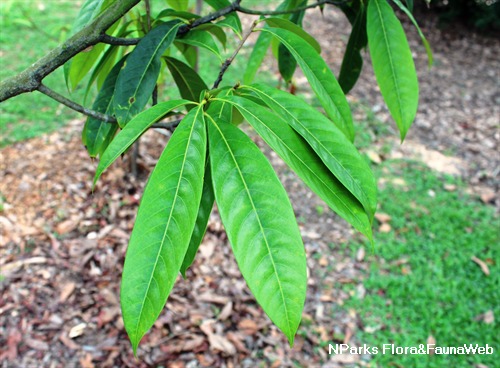
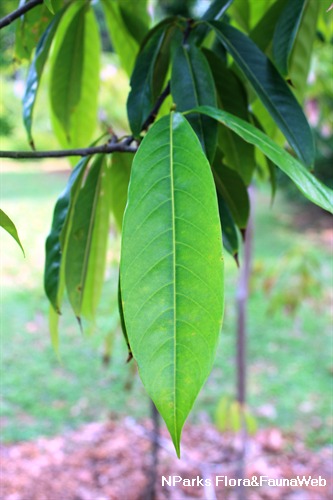
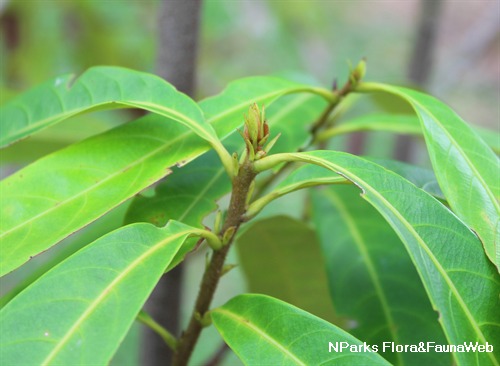
.jpg)
.jpg)
